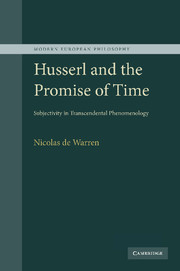Book contents
- Frontmatter
- Contents
- Acknowledgments
- List of abbreviations
- Introduction: the promise of time: subjectivity in Husserl's transcendental phenomenology
- 1 The ritual of clarification
- 2 A rehearsal of difficulties
- 3 The ghosts of Brentano
- 4 The retention of time past
- 5 The impossible puzzle
- 6 The lives of Others
- 7 The life of consciousness
- Appendix: note on textual sources
- Bibliography
- Index
4 - The retention of time past
Published online by Cambridge University Press: 20 January 2010
- Frontmatter
- Contents
- Acknowledgments
- List of abbreviations
- Introduction: the promise of time: subjectivity in Husserl's transcendental phenomenology
- 1 The ritual of clarification
- 2 A rehearsal of difficulties
- 3 The ghosts of Brentano
- 4 The retention of time past
- 5 The impossible puzzle
- 6 The lives of Others
- 7 The life of consciousness
- Appendix: note on textual sources
- Bibliography
- Index
Summary
Ja am liebsten spreche ich selbst über Dinge, die noch nicht erledigt, vielmehr im Fluß begriffen sind.
— HusserlAn indirect approach
Husserl conceived of the ITC lectures as an initiation to the phenomenological problem of time-consciousness, not only for his students, but most of all for himself. As with many of his lecture courses, Husserl develops a path of thinking without any preconceived expectation of where it might lead. As Husserl remarks, “we want to follow [these problems] however far we can. Where we can proceed no further, we at least want to formulate clearly the difficulties and possibilities of interpretation; we want to make clear to ourselves where the genuine problems reside, and how to give them a conclusive formulation” (Hua X, xvii). Such an experimental approach allows Husserl to suspend the demand for conclusive results and polished arguments that a presentation in book form would necessarily have required. As Husserl candidly notes, “where I remain silent as an author I can therefore speak as a teacher [Worüber ich mich als Autor ausschweige, darüber kann ich mich als Lehrer darum doch aussprechen]” (Hua X, xvii). Subsequent writings on time-consciousness remained committed to exploring the “difficulties” and “possibilities of interpretation” that rapidly elevated the theme of time-consciousness to “the most difficult of all phenomenological problems” (Hua X, 276 [286]). Indeed, as discussed in chapter 3, despite significant progress, difficulties originally manifest in Brentano's original association still haunt Husserl's thinking, resurfacing in unexpected form within Husserl's own analysis.
- Type
- Chapter
- Information
- Husserl and the Promise of TimeSubjectivity in Transcendental Phenomenology, pp. 141 - 176Publisher: Cambridge University PressPrint publication year: 2009

